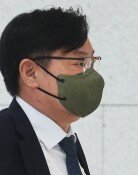Special advisory committee must not act like ‘occupation forces’
Special advisory committee must not act like ‘occupation forces’
Posted May. 26, 2017 07:10,
Updated May. 26, 2017 07:20
The State Affairs Planning Advisory Committee, President Moon Jae-in’s de facto transition team, is receiving reports from 22 government departments and agencies for three days starting on Wednesday. “Coming off as occupation forces would make it impossible for us to get proactive cooperation from public sector,” said Kim Jin-pyo, the head of the advisory committee, apparently conscious of the past records of transitional committees’ overbearing behavior, urging his members to show exemplary leadership and self-sacrifice, but it appears that his request has not succeeded.
During a briefing on Wednesday, the Ministry of Foreign Affairs explained about the situation where it was difficult to pursue dialogue with North Korea owing to a series of provocations from the regime last year, and a member of the special committee responded with admonition, blaming the foreign ministry for “failing to foster an environment for dialogues.” This is clearly a tall order and a reflection of the committee’s lack of understanding about the work environment in which the ministries were bound to follow the policy direction of the former Park Geun-hye administration. Before the formal face-to-face meeting, the advisory committee demanded a written report inquiring “the policy evaluation on the previous administration and potential improvements from the new government’s policy direction,” which sounds like an order for a letter of apology for the projects pursued by the previous administrations.
One of the requests from the advisory committee is to abolish merit-based salary system in public institutions, which is little less than demanding that the public sector reforms, one of the four major reforms driven by the Park administration, should be scrapped altogether. “Corruption of private education has plagued our society for 20-30 years, and we need to come up with a measure to prevent our students, parents, and teachers from suffering from the problem,” said Kim Yun-myung, the head of society subcommittee, during the Education Ministry’s report on Wednesday. The glaring intention behind his remarks is to push for the revision of private education law, which was thwarted by the strong opposition from the opposition parties and the private school foundation of Korea during the Roh Moo-hyun administration.
Transition committees were often subjected to criticism for their overbearing behaviors. President-elect Lee Myung-bak's transition team chairman Lee Kyung-sook had to apologize several times after members of the real estate policy advisory team was sacked after receiving a large sum of money for offering consultancy, and officials of the national competitiveness special committee traveled all the way down to Ganghwa Island to get free lunch at a fancy eel restaurant. When the transition team for the Roh Moo-hyun administration, which primarily consisted of young scholars, was receiving a report from the labor ministry, one member stormed out of the room as he was not happy with the ministry’s briefing.
The role of transition committee is to maintain the consistency of state affairs by weighing the merits and demerits of the previous administration objectively and learning a lesson from failures, thereby instilling the new administration with the philosophy of their newly elected president. Kim Jin-pyo, the head of the state affairs planning advisory committee, told a recent interview, “An important role for the state affairs planning advisory committee is to ram home the new philosophy of the Moon Jae-in administration to the government officials who have been immersed in conservative values over the 10 years of conservative rule.” Coming out of the mouth of someone who called for taking heed of coerciveness, the remarks are highly regrettable. The members of the advisory committee need to remember that if they think of public servants as a subject of correction instead of partners, the vital task of reforms that the new government is faced with would not succeed with ease.
Headline News
- Med professors announce intention to leave hospitals starting Thursday
- Bridge honoring Sgt. Moon Jae-sik unveiled in Pennsylvania
- Chief of Staff Chung tells presidential secretaries to stay away from politics
- US FTC bans noncompete agreements
- N. Korea launches cyberattacks on S. Korea's defense companies







